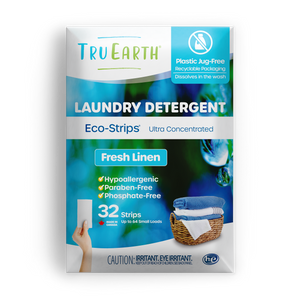Water stains on glass surfaces can be a frustrating eyesore that can detract from the beauty of your home. Those unsightly water stains can seem stubborn and challenging to remove, Whether on your windows, shower doors, or glass tabletops.
However, there is nothing to worry about! In this article, we'll provide you with various effective methods and techniques to banish water stains from your glass surfaces and restore their pristine clarity. From simple household items to specialized cleaners, we've got you covered with safe, affordable, and environmentally friendly solutions.

How Do Water Stains on Glass Come To Be?
Water stains on glass occur when mineral deposits from hard water dry and leave behind residue on the surface. Hard water contains minerals such as calcium, magnesium, and other dissolved solids. When water evaporates on glass, these minerals remain, creating those unsightly spots and streaks.
Over time, if not addressed, these water stains can become more challenging to remove and may even lead to permanent etching on the glass. However, with the right approach and cleaning methods, you can tackle water stains effectively and restore the glass's original luster.
Cleaning Glass with Vinegar
One of the most popular and effective methods for removing water stains from glass is using white vinegar. Vinegar is a natural, non-toxic cleaning agent that can break down and dissolve mineral deposits, making it ideal for tackling water stains. Here's a step-by-step guide to using vinegar to clean your glass surfaces:
Prepare the Cleaning Solution
Mix equal parts of white vinegar and water in a spray bottle. For tougher stains, you can use undiluted vinegar.
Spray and Soak
Spray the vinegar solution directly onto the water-stained glass surface. Ensure that the affected area is thoroughly coated. Let the solution sit and soak for a few minutes to allow the vinegar to work its magic on the stains.
Scrub Gently
Use a soft cloth or a non-abrasive sponge to scrub the glass, focusing on the water-stained areas gently. The vinegar will help loosen the mineral deposits, making it easier to remove them.
Rinse and Wipe
After scrubbing, rinse the glass surface with clean water to remove any remaining vinegar and loosened deposits. Wipe the glass dry with a clean, lint-free cloth to prevent water spots from forming during the drying process.
Please note that while vinegar is generally safe to use on most glass surfaces, it's essential to test a small, inconspicuous area first, especially if you have coated or tinted glass.
Using Baking Soda for Stubborn Stains
For more stubborn water stains, combining baking soda with vinegar can provide an extra cleaning boost. Baking soda, also known as sodium bicarbonate, acts as a mild abrasive, which can help dislodge tough mineral deposits. Here's how to use baking soda in conjunction with vinegar:
Create a Paste
In a small bowl, mix baking soda with enough water to form a thick paste. The paste should be spreadable but not too runny.
Apply the Paste
Using a soft cloth or sponge, apply the baking soda paste to the water-stained areas on the glass. Gently rub the paste into the stains in circular motions.
Add Vinegar
Once the baking soda paste is applied, lightly spray or dab vinegar over the paste. The vinegar will react with the baking soda, creating a gentle foaming action that helps break down the mineral deposits.
Scrub and Rinse
Using a non-abrasive sponge or cloth, gently scrub the glass surface to work the baking soda and vinegar into the stains. Afterward, rinse the glass with clean water to remove the residue.
Remember to avoid using excessive force or abrasive materials while scrubbing, as this can scratch the glass surface. Always opt for gentle cleaning methods to preserve the glass's integrity.
Lemon Juice for a Citrusy Clean
Lemon juice is another natural remedy that can help remove water stains from glass while leaving behind a refreshing citrus scent. Lemon juice contains citric acid, which has mild acidic properties that work effectively on mineral deposits. Here's how to use lemon juice for your glass cleaning:
Squeeze Fresh Lemon Juice
Start by squeezing fresh lemon juice from a lemon into a small bowl. You can also use bottled lemon juice, but fresh lemon juice tends to be more potent.
Apply the Lemon Juice
Dip a soft cloth or cotton ball into the lemon juice and apply it directly to the water stains on the glass. Ensure the stains are well-coated with the lemon juice.
Allow It to Sit
Let the lemon juice sit on the stains for about 5 to 10 minutes to allow the citric acid to work on dissolving the mineral deposits.
Wipe and Rinse
Use a clean, damp cloth to wipe away the lemon juice and loosened deposits from the glass. Rinse the glass thoroughly with water and dry it with a lint-free cloth.
As with all cleaning solutions, it's essential to test a small, inconspicuous area first when using lemon juice on coated or tinted glass.
Specialized Glass Cleaners
While natural remedies like vinegar and lemon juice can work wonders on water stains, some situations may require the use of specialized glass cleaners. Commercial glass cleaners are formulated to tackle tough stains and leave glass surfaces streak-free and crystal clear.
When choosing a glass cleaner, opt for one that is specifically designed to remove water stains and mineral deposits. Always follow the manufacturer's instructions and safety guidelines when using any cleaning product.
Preventing Water Stains on Glass
Prevention is always better than cure when it comes to water stains on glass. While it's not always possible to completely avoid water contact with glass surfaces, there are several measures you can take to minimize the chances of water stains:
Wipe Dry
After washing glass surfaces, such as windows and shower doors, make it a habit to wipe them dry with a clean, lint-free cloth. This prevents water from evaporating and leaving behind mineral deposits.
Use a Squeegee
When cleaning glass shower doors, use a squeegee after each use to remove excess water. This simple step can significantly reduce the formation of water stains.
Consider Water Softeners
If you have hard water in your area, investing in a water softener can help reduce the mineral content in the water, preventing the buildup of water stains on glass surfaces.
Coating and Sealants
Consider applying a protective coating or sealant to your glass surfaces. These products create a barrier that repels water and prevents mineral deposits from sticking to the glass.
Regular Cleaning
Keep up with regular cleaning and maintenance of your glass surfaces to prevent stains from becoming stubborn and harder to remove.

Wrapping Up- Achieving Crystal Clear Glass Free from Water Stains
With the methods and tips outlined in this blog post, you can now confidently tackle water stains on your glass surfaces and restore their clarity and shine. Whether you choose natural remedies like vinegar and lemon juice or opt for specialized glass cleaners, be sure to follow the recommended steps and safety guidelines.
Remember to test any cleaning solution on a small area first, especially if you have coated or tinted glass. By incorporating regular maintenance and preventive measures, you can keep your glass surfaces sparkling and free from water stains. So go ahead and enjoy the beauty of crystal-clear glass in your home!


